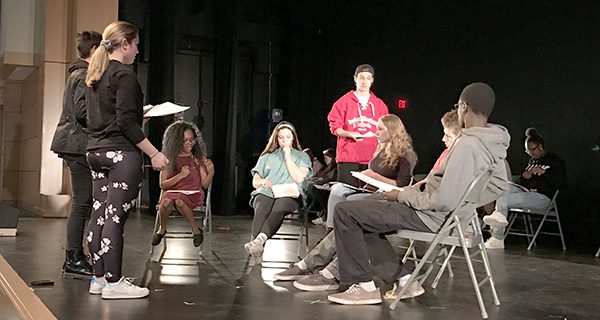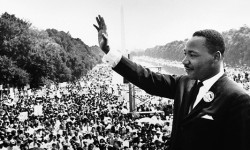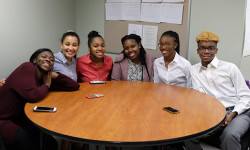[ccfic caption-text format="plaintext"]
By Lisa Moore
Hometown Weekly Correspondent
When Director Stephen Wrobleski began planning the winter play, he knew he wanted to produce another devised play. When a play is devised, it is created as a collaboration of ideas from the whole cast and crew. During the process, Wrobleski uses a starting point or frame of reference from which the group builds their play. The idea for this year’s production came when Principal Jamie Chisum and Wellesley Public Schools METCO director Kalise Wornum suggested using this year’s METCO 50th anniversary as the starting point. Wornum provided the cast and crew with copies of letters written by Wellesley residents to the school committee in 1967 about the then-proposed METCO program. There were both positive letters by residents supporting the program and negative ones denouncing the program.
As the group worked on creating the play, they explored many issues around race. To support their conversations, Dr. Chisum, Ms. Wornum, and teacher Jeannie Goddard facilitated the discussions, helping the students navigate through this complex topic and the emotions it brought out in them. “We didn’t set out to do a dramatization of the events of 50 years ago. Instead, we ended up creating a piece that highlights some of the challenges facing students in the METCO program.” said Wrobleski.
First-time student directors Tess Buckley and Zoe Salvucci said students jumped at the idea to do a show like this. “We feel this show would be very impactful in light of things happening this year.” said Buckley.
Veteran actor Anand Ghorpadey spoke about his experience working on the show. “This is my second winter play. This one was a very different process to create this show. The subject matter was so much more serious and we played on the experiences of the actors, it was a challenge due to their different experiences.”
For Sofia Ko, this was her first winter play. “It was an interesting process,” she said about the experience. “[Wrobleski] would give us prompts and we developed ideas off of actual experiences. It hit home for some of us.”
Nykia Lumley had not acted before, but was excited to do this show when she learned about it. As a student in the METCO program, she shared her experiences for the show, saying, “I liked doing this play, it brings life to my experiences. It brought people closer during the process.”
Zimmie Obiora, also a student in the METCO program, has been involved with productions in the past, her experience mostly in the tech department. Knowing the producers Zoe and Tess, though, made her want to audition. “I am not too confident in my acting abilities, but I am putting myself out there. I have been sharing my METCO experiences with others and reflecting on myself. It has given me the opportunity to sort out my own experiences of METCO and come to terms with the good and the bad. It was not necessarily a positive experience, but it was a necessary one.”
With minimal sets or costumes, dramatic lighting was used to set the tone and mood of the scenes. In between scenes, actual letters written to the Wellesley School Committee in 1967 were read to the audience, some negative, others positive. Actors gave direct - and frank - comments that expressed what they would like to say to the authors of those letters. In a Brechtian theater style, the actors often broke the “fourth wall,” directly engaging the audience and forcing them to focus on the important themes so as not to get lost in an illusionary world of the play.
At the end of the show, three students from the METCO program delivered a powerful monologue, detailing some of their experiences over the last 13 years at WHS. Their words held the audience in rapt attention, delivered with the raw emotion of the challenges they have faced.
After the production, School Committee member Michael D’Ortenzio asked family of the original School Committee members from 1967 - those who voted to approve the METCO program at WHS, making Wellesley one of the founding METCO districts - to stand and be recognized for the courage, wisdom and foresight of their family members.
In addition, Paula Jackson, one of the first students in the METCO program was recognized, sharing, “When I took that ride in 1966, I had no idea. We learned from bumps in the road. Wellesley has come a long way.”
This production of “Now in Color” is an honest telling of students’ experiences with race at a time when the Wellesley community is addressing concerns around race and community inclusiveness. “Our community has some issues to grapple with this year,” said Stephen Wrobleski. “The response by the administration has been thoughtful and consistent. We as a staff have devoted much of our professional development time to these issues. This show is another way to reach out and try to talk about issues of race. We as a cast have talked a lot about the idea that we are not presenting the show to provide answers to these problems, we are presenting the show to start a conversation about these problems.”
What remains now is for Wellesley to continue to learn from the “bumps in the road,” and to follow up this thought-provoking, emotion-filled production by discussing strategies and ways to address issues of race and inclusiveness that still exist at WHS.

























